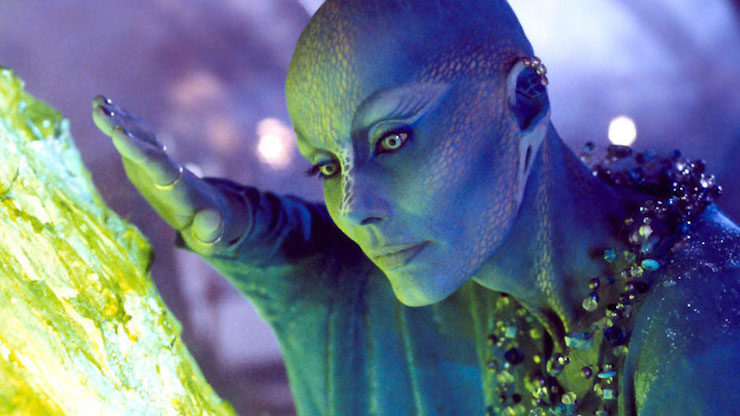Consider this: you are two thousand years in the future.
You live in a different part of the galaxy.
You have never seen Earth and it’s not even a planet you are sure is still out there.
So which religion do you follow?
Christianity says Jesus will return to Earth one day. Would it matter to someone hundreds or thousands of light years away if a son of God goes back to another planet? They’re not going to see it.
In Islam, one makes a pilgrimage to Mecca. I imagine it would be very difficult journey when one is so far from the planet where Mecca exists.
What of religions that just revere aspects of the planet one is on? Can those translate? If someone is not on a planet and they are surrounded by stars on all sides, and they can actually go and journey to their stars, do they worship mere planets or do they feel themselves beings who exceed them? What faith evolves in a Type III Civilization?
It is a tantalizing question to ask, and I think most science fiction asks it. I happened to grow up on TV sci-fi and it was all hugely influential on me. Eventually, in any story about human civilization—even a space-dwelling one—religion seems to play a role. Even areligious Star Trek is remarkable and notable in its avowed absence of religion, and there is an exception noted below.
So: here are five instances of religion in TV science fiction.
Babylon 5
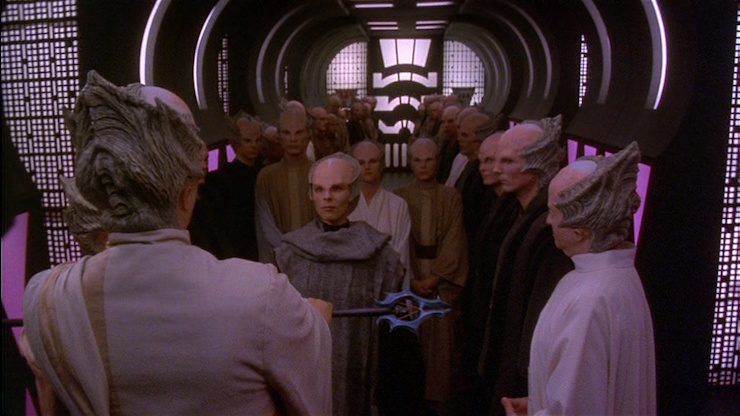
Babylon 5 is set in the aftermath of a war between the humans of Earth and the technologically superior Minbari. A great mystery is presented early on: the Minbari were closing in on Earth, plowing through the human fleet, and yet on the cusp of total victory, they captured a single human pilot, inspected him—and instantly ended the war.
Why?
This is a mystery that hangs over that human pilot, the commander of Babylon 5—Jeffrey Sinclair—and the character of Delenn, posing as a Minbari ambassador on Babylon 5 the space station, but secretly a member of the ruling Grey Council that presided over the Minbari, and one of the three religious branch members.
As someone who grew up on Star Trek, this was the first true wedding of religion and science fiction that I recall being exposed to, because the beliefs of the Minbari both provided the initial mystery—as religions often appear to outsiders—and with further understanding helped shape viewer understanding of the very meticulously planned plot as it unfolded. The Minbari belief that human beings in fact are born with the souls of the dead Minbari turns out to be both a unifying point, and one of contention within the Minbari Grey Council itself, leading to an intense degree of conflict and compelling turns of story. Religion added a depth and a new dimension, a new world view that would’ve been lacking otherwise.
Farscape
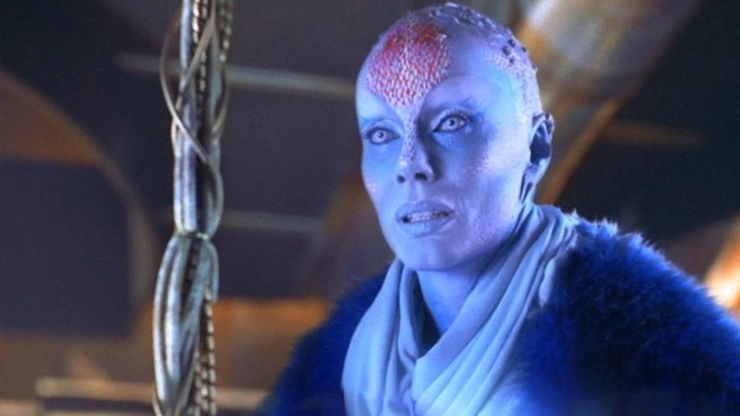
In Farscape, the most evident example of religion is in the character of Zhaan, who is a blue-skinned alien fugitive priest. In a way, Zhaan is in the Vulcan shape of a serene exterior that indicates mastery of a far more volatile interior. In science fiction, though, there’s liberty to do something very important: things that are metaphorical for us or just products of fantasy can in fact be real. Zhaan has intense mental powers of sorts, and all those gifts of the mind some people have faith they can gain through meditation, etc. are actually hers to command. When her species is encountered, their entire hierarchy and caste system is informed by this faith, and only through its lens do we comprehend this new, alien species.
Deep Space Nine
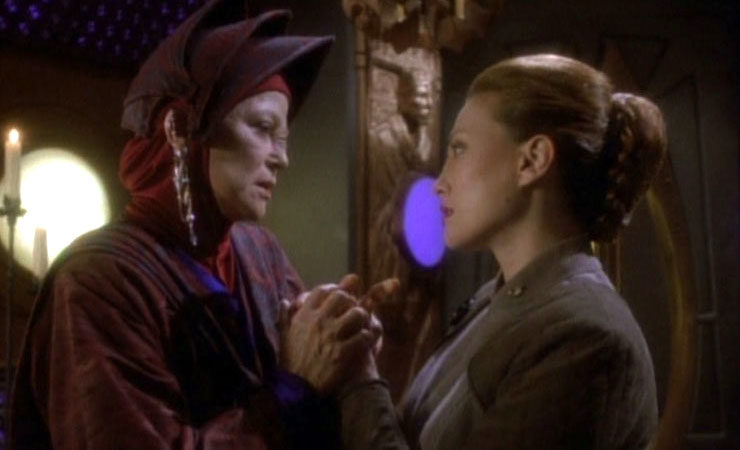
Star Trek, for the most part, presents a future without religion. Deep Space Nice was a notable exception for a very good reason. In this case, the aliens in question are a species called the Bajoran who have been suffering under a brutal occupation by the Cardassians for a very long time. Bajor has something we on Earth do not: they formed the entirety of their religion around a phenomenon they actually experience first-hand: a wormhole in close proximity to their planet, with powerful incorporeal aliens that exist within. They are able to communicate with these aliens with these ancient orbs, and so their religion in fact has a few assets: it has remained a touchstone of their cultural identity during a time when another culture is attempting to crush it, and there is actual, tangible evidence verifying some of its existence.
That’s an interesting thing that can be done in science fiction and fantasy. The wormhole aliens actually do provide something of a custodial role to Bajorans much like a deity might, and in fact, one character on the show who becomes enshrined as a religious figure on Bajor discovers a close tie to them extending back before birth. The use of religion here is a departure from Trek norms, and yet it completely adds dimension and a charge to the story that would’ve been difficult to work in without that intense, visceral, emotional force that is faith.
Battlestar Galactica
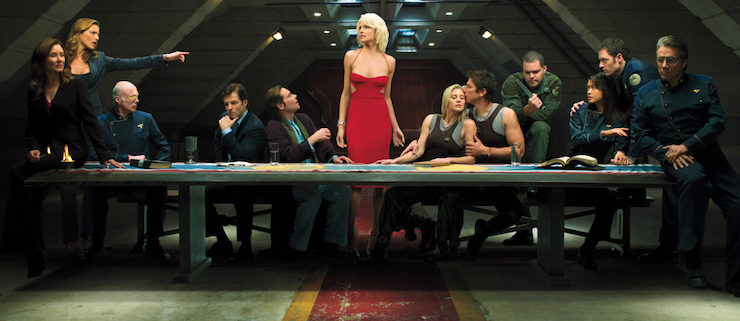
Ronald D Moore worked on DS9, so it shouldn’t be surprising his BSG remake also featured a religious aspect. Ironically, it’s the cyborgs created by human beings who have embraced the idea of a single God, and a predestined conflict. This religion crops up repeatedly throughout the show, and the iconic character of Six—the first cyborg we see, one who pops up repeatedly in different incarnations throughout the show—is a believer both in physical and psychological form (you’d have to see to understand the latter). This shapes a continuity to her character even when she’s, well, many different characters throughout the show.
The Orville
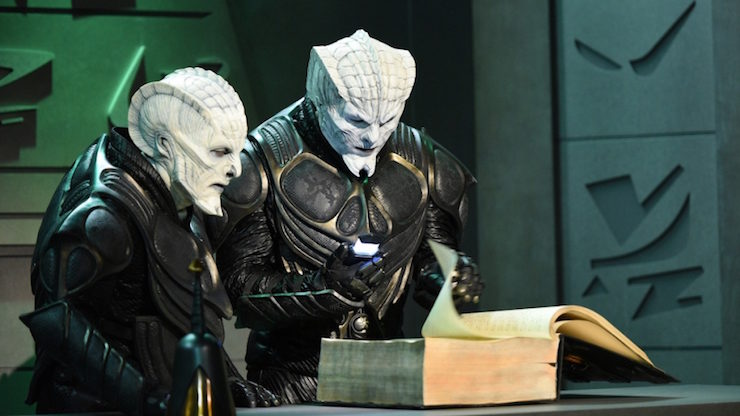
This is a relatively young show, but one of these early episodes acquaints us more closely with the primary enemy of the crew, a species called the Krill. Apparently this is a highly religiously driven species, with a guarded sacred text, and so in order to understand the enemy, Captain Mercer has to infiltrate the Krill and steal a copy of that text.
Religion in this case has provided a framework for understanding an alien species, and an unwavering, relentless barrier to peace with that species. The Krill faith enshrines an expansionist, aggressive ideology that demands they dominate other civilizations in service of their God (comically named Avis like the rental car company).
In my recent novel The Empress (sequel to The Diabolic), the story is set in an Empire that has evolved for thousands of years completely removed from the planet Earth. It made no sense to me that these people would continue to follow the same religions that dominate today.
Religion in these two novels is used as a marked divide between the Grandiloquy space dwellers, and the Excess who live on planets who remain closer to traditional faiths. Religion plays a role in world-building, driving plots, shaping characters, creating a lens through which to understand a new planet, a new species, and essentially rendering what would be a totally foreign world understandable to those of us acquainted only with this one.
 S.J. Kincaid originally wanted to be an astronaut, but a dearth of mathematical skills turned her interest to science fiction instead. Her debut novel, Insignia, was shortlisted for the Waterstones prize. Its sequels, Vortex and Catalyst, have received starred reviews from Kirkus Reviews and Booklist. The Diabolic and its sequel, The Empress, are available from Simon & Schuster Books for Young Readers.
S.J. Kincaid originally wanted to be an astronaut, but a dearth of mathematical skills turned her interest to science fiction instead. Her debut novel, Insignia, was shortlisted for the Waterstones prize. Its sequels, Vortex and Catalyst, have received starred reviews from Kirkus Reviews and Booklist. The Diabolic and its sequel, The Empress, are available from Simon & Schuster Books for Young Readers.










